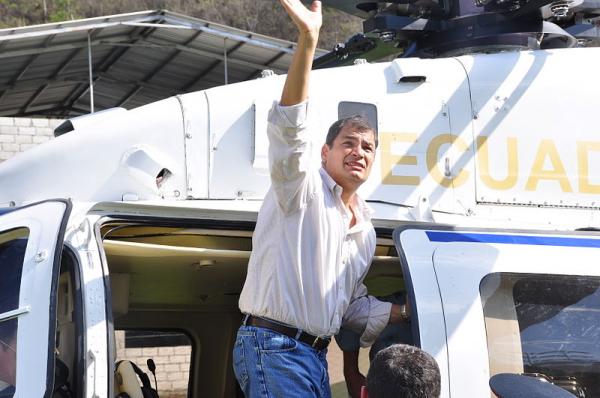 Controversy erupted earlier this week after the journalism department of Argentina's National University of La Plata awarded Ecuadorean President Rafael Correa the Rodolfo Walsh Prize for freedom of expression. Proponents of media freedom have harshly criticized Correa for his treatment of the Ecuadorean press. But such criticisms fail to acknowledge the reasons underlying the media policies of President Correa, whose government recently granted political asylum to government transparency advocate and WikiLeaks Editor-in-Chief Julian Assange.
Controversy erupted earlier this week after the journalism department of Argentina's National University of La Plata awarded Ecuadorean President Rafael Correa the Rodolfo Walsh Prize for freedom of expression. Proponents of media freedom have harshly criticized Correa for his treatment of the Ecuadorean press. But such criticisms fail to acknowledge the reasons underlying the media policies of President Correa, whose government recently granted political asylum to government transparency advocate and WikiLeaks Editor-in-Chief Julian Assange.
In bestowing the award on Tuesday, the university cited the Correa administration's creation of the television network teleSUR and new laws protecting the right of communication –- lauding Correa for opposing the "hegemonic will that aims to restrict speech," for promoting free expression of the "poor and marginalized sectors of society," and for "democratizing access to the media" in Ecuador.
Correa has fielded criticism for the fact that he has responded to press attacks against him with lawsuits, prosecutions, regulation, and confiscations of media outlets. This year the U.S. government granted political asylum to El Universo journalist Emilio Palacio, after Palacio was fined and sentenced to prison time for calling Correa a "dictator". (Correa ultimately pardoned Palacio and others who had received similar sentences.) Reportedly, this year the Ecuadorean government shut down 14 radio and television stations. After seizing a number of media outlets from bankers on grounds of corruption, the government went from controlling one radio station to owning numerous media enterprises. The administration has also tried to pass a new law that would restrict private media ownership to 33% of all media, with the state controlling 33% and community media comprising 34%. Moreover, Ecuador's new Constitution aims to ban bankers from owning business interests in the media, and to ban media corporations from owning business interests in other industries. These actions have generated rebukes from the Committee to Protect Journalists, the Inter American Press Association, Unesco, the Organization of American States' Special Rapporteur for Freedom of Expression, Freedom House, and others.
WikiLeaks founder Julian Assange has recently come under fire for a perceived contradiction between his organization's promotion of government transparency and his acceptance of political asylum from Ecuador. However, these criticisms fail to take into account Correa's stated reasons behind Ecuador's media policy. What his government opposes, the President says, are media corporations that have tried to "destabilize our government to avoid any change in our region and lose ... power ...." Correa, who is said to have faced consistent media defamation and misinformation, has characterized the press as his "greatest enemy" and an obstacle to reform.
In fact, a U.S. embassy cable acknowledged truth to Correa's assertion that his country's media "play a political role, in this case the role of the opposition." Only months after Correa became president, 11 Ecuadorean daily newspapers published the same front-page editorial attacking him. This was described as "an unprecedented example of coordinated press rebuke to a sitting president." In Ecuador, private media have traditionally served the interests of their owners –- powerful groups with economic agendas. These elites, Correa states, fear fair wealth distribution. Correa noted that when he was first elected, five of the seven television channels were owned by bankers, and none owned by the state. A strong WikiLeaks supporter, Correa has also pointed out that Ecuador's media stopped publishing leaks from Assange's organization when the disclosures conflicted with their own interests.
Mark Weisbrot, from the Center for Economic & Policy Research, has stated that the recipients of fines and prison sentences in Ecuador "were convicted of libel because they told very big lies in print, falsely accusing Correa of crimes against humanity. Under Ecuadorian law, he can--like any other citizen--sue them for libel, and the court can and did find them guilty.... Rather than being a heroic battle for freedom of expression against a government that is trying to "silence critics," it is a struggle between two political actors. One political actor is the major media, whose unelected owners and their allies use their control of information to advance the interests of the wealth and power that used to rule the country; on the other side is a democratic government that is seeking to carry out its reform program ..."
President Correa accepted the Rodolfo Walsh Prize "on behalf of the Ecuadorian people," emphasizing that Ecuador is intolerant not of the media but of "lies, deception and corruption."
Prior award recipients include Venezuelan President Hugo Chavez and Bolivian head of state Evo Morales.
Theme by Danetsoft and Danang Probo Sayekti inspired by Maksimer